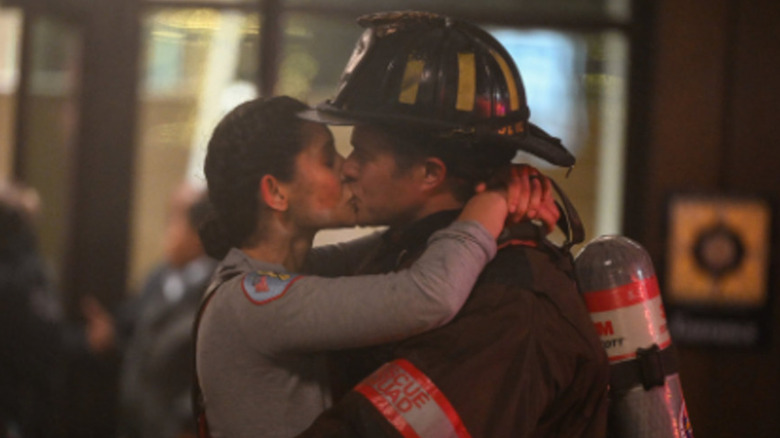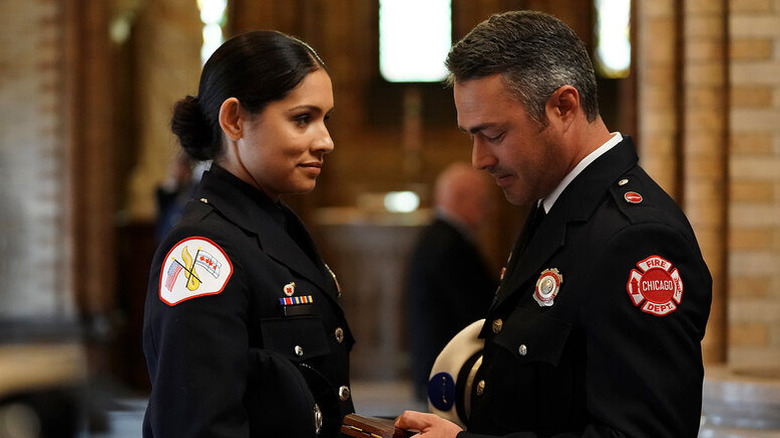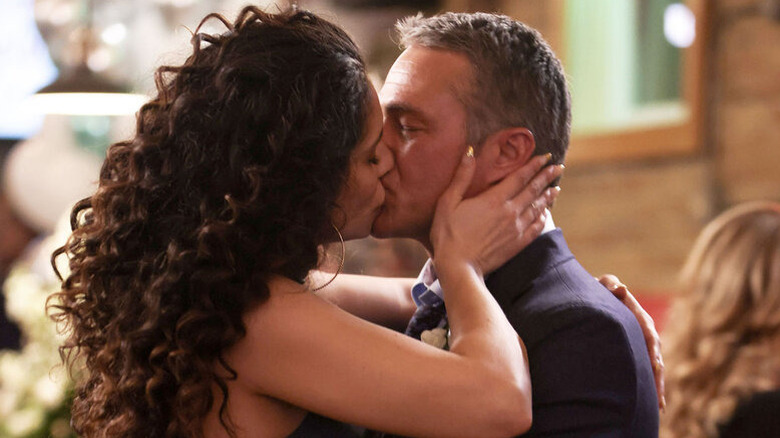In the searing emotional epic that is Chicago Fire, few characters have burned as fiercely or as brilliantly as Stella Kidd. Played with raw grace by Miranda Rae Mayo, Stella has long stood as one of Firehouse 51’s most resilient and dynamic members—a fighter, a leader, and a woman who refuses to be broken. But while her courage has always lit up the screen, her past has remained mostly in the shadows. Until now.
In the soul-baring episode titled “Relief Cut,” the veil is finally lifted, revealing the haunting depths of Stella’s childhood and the invisible scars that still shape her. What unfolds is not just a character study—it’s a reckoning. A confrontation with the ghosts that have haunted her since she was twelve, and a potential turning point in her future with the man who has stood by her through it all: Kelly Severide.

For years, fans have seen glimpses of Stella’s troubled history. We’ve known about the tragedy that stole her parents at a formative age. We’ve watched her carry the weight of trauma in silence, even as she rose to become one of the most respected firefighters in Chicago. Her past was touched on—hinted at in her failed marriage to Grant Smith, a man whose violent nature and destructive grip nearly claimed her life. But those were only fragments.
“Relief Cut” finally stitches the full story together—and what it reveals is as devastating as it is enlightening.
At the heart of this episode is a long-overdue visit from Stella’s cousin, a blood relative who holds the key to long-buried memories. Their reunion is more than just a family check-in—it’s a catalyst. A door swinging wide open onto a past that Stella has worked hard to lock away. With every word exchanged, more of Stella’s childhood comes into view: the emotional abandonment, the hunger for stability, the sharp edges of survival that shaped her worldview.

We learn that after her parents’ untimely deaths, Stella spiraled into a world of chaos. The streets became her classroom, the wrong people her makeshift family. She found solace in rebellion—drugs, danger, and ultimately, the arms of Grant Smith, a man whose twisted sense of love only deepened her wounds. It wasn’t just that she was trying to outrun grief. She was trying to build something solid in a world that had collapsed beneath her feet.
And yet—she survived.
This episode doesn’t paint Stella as a victim. It honors her resilience. But it also peels back the layers of her armor, revealing something far more tender: fear. Not fear of fire or pain—Stella has stared down both. But the fear of motherhood. Of becoming someone’s anchor when she never had one herself.
This revelation rocks the foundation of her marriage to Kelly Severide (Taylor Kinney), a man who has long seen her strength, but perhaps never fully understood the source of it. In true Severide fashion, he doesn’t push. He doesn’t demand. But he does dig. Quietly. Carefully. Lovingly.

Kelly’s gentle investigation into Stella’s hesitations about starting a family isn’t driven by impatience—it’s driven by understanding. And what he uncovers doesn’t just illuminate Stella’s fears. It deepens his love for her.
For Stella, motherhood isn’t a dream deferred—it’s a battlefield. The thought of raising a child brings every childhood nightmare back into sharp relief. What if she can’t protect them? What if she repeats the cycle? What if her broken beginnings leave her ill-equipped to build something whole?
But through Kelly’s unwavering support, and the clarity brought on by her cousin’s visit, Stella begins to see another path. A path where the past doesn’t have to dictate the future. Where pain can be transformed into purpose. Where love isn’t just survival—it’s healing.
“Relief Cut” is more than a turning point in the narrative. It’s a psychological excavation of a woman who has often carried her burdens alone. And by the end of the episode, something powerful happens: she begins to set them down.
The moment of catharsis comes not with grand gestures, but with quiet connection. Stella opens her heart to Kelly—not just as a partner, but as someone she trusts to help carry the weight of what’s to come. Their future is still uncertain, but it’s no longer clouded by unspoken trauma. It’s illuminated by a shared understanding.

This episode also lays emotional groundwork for what may be one of Chicago Fire’s most impactful arcs to date: Stella and Kelly building a family not out of obligation, but out of choice. Out of healing. Out of hope.
And make no mistake—this isn’t the start of a saccharine domestic storyline. This is Chicago Fire. There will be setbacks. Struggles. Fears that return like embers waiting to flare. But Relief Cut makes one thing clear: the storm that forged Stella Kidd may have been cruel, but it did not define her.
She defines herself.
With each step forward, she chooses not to be the girl abandoned by fate, or the woman broken by love, but a fierce, compassionate, unrelenting survivor who dares to believe in something better.





